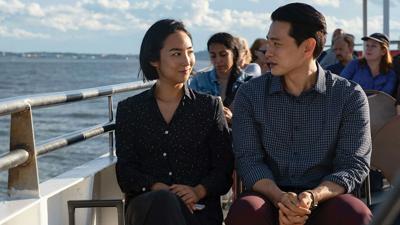Past Lives opens with a shot of three people sitting at a bar in New York. From off-camera we hear the voices of a few other bar patrons, indulging in the time-honored sport of people-watching. Who are these three people, the observers speculate, noting that the trio consists of an Asian woman, an Asian man and a white guy? What’s their story? What’s their dynamic? Who’s married to who? Who loves who?
From there, the movie explores the story behind that simple image of three people perched along a row of barstools. Writer-director Celine Song, in her film debut, leads us on a memorable journey.
The narrative quickly flashes back more than 20 years, when two of the principals, Nora (Greta Lee) and Hae Sung (Teo Yoo), meet as school kids in Seoul. They’re adorable besties, competing gleefully in academics and walking companionably home from school every day. But their lives are about to diverge, as Nora’s parents plan to relocate the family to Canada. Nora’s mom, knowing the trauma her daughter is about to experience, suggests the tweens go on a date. It’s one of the golden moments the film depicts, a gem on the string of incidents that make up their relationship.
One of the things to like about Past Lives is that it depicts the congruence between a person as a child and an adult. Little Nora already has ambitions as a writer — she notes that leaving Korea for the West may give her a better shot at a Nobel prize.
Twelve years pass, and the two have grown into adults. Hae Sung tracks down Nora via Facebook, and the digital reconnection turns into an intense online-only relationship. But she lives in New York and he still lives in Seoul — there doesn’t seem much likelihood that they’ll meet up in person anytime soon. Feeling their long-distance circumstances are untenable, Nora decides the couple need to take a break. The die is cast when she meets and marries a fellow New York writer (John Magaro). After further unfolding, the story reaches the movie’s present, the timeline of the trio’s visit to the New York bar. What happens is achingly sweet. Director Song manages to create a deeply emotional romance without tear-jerking or melodrama.
And we the audience surely need romances in today’s cinematic multiverse. It seems like the best that Hollywood can currently manage is the occasional formulaic rom-com, sticky with clichés.
Past Lives reminded me a bit of a very different film — The Way We Were, which screened recently as part of the Belcourt’s 1973 series. Though that film had richer layers of history in the narrative, and the iconic faces of Barbra Streisand and Robert Redford, it also touched on the notions of intertwined lives and love tempered by wisdom.
Invoking those superstars, of course, is unfair to Yoo and Lee. They have very different jobs in a film that chooses naturalism over Hollywood heart-string-yanking. Both deliver performances that are luminous yet relatable.
Song also has Nora bring up a Korean philosophy, perhaps derived from Buddhism, stating that people may appear to be perfect strangers but are secretly related by centuries of connection in previous lives. I’m not so sure about the concept of multiple lives, but I am sure it’s worth weaving this movie into your current one.





